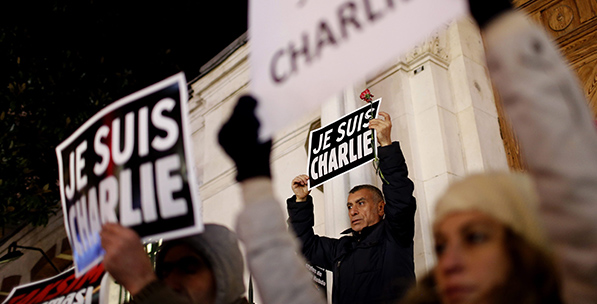When Anders Breivik, a terrorist, targeted the citizens of Norway and teenagers on the island of Utoya a few years ago killing more than 70 people, he declared his main goal was to attract attention to the rising “Islamic threat” in Europe. In his writings he defended and propagated the idea of the necessity to deport all Muslims from Europe. Shortly after, his writings became a source of motivation for different radical groups to rally people. The same effect may take place after the Paris attack and there may be increasing empowerment of radicals as a result of these attacks. The first step to stop this radicalization is taking place in very somber commemorations in different parts of the world and the reaction to the violence as well as Islamophobia by the public.
Witnesses have described the events that took place in Paris the other day as a scene from a horror movie. Three terrorists stormed into the offices of the satirical magazine Charlie Hebdo with automatic rifles and killed 12 people including prominent cartoonists, editors and journalists of the magazine as well as two policemen and a maintenance worker. Together with Parisians, the whole world witnessed the horror that was perpetrated by these terrorists, especially the cold-blooded killing of a wounded police officer, who turned out to be Muslim himself, by a cellphone recording. On Wednesday night, in different parts of the world people were reacting to this terrorist attack by organizing vigils for the victims and standing up for freedom in the main squares of different cities.
Although organized, perpetrated and claimed by different organizations, individuals and groups, the threat of terrorism seems to be a growing problem that the international public needs to understand, assess and deal with in the coming years. To fight this threat that constantly adapts itself to a changing global order, geopolitical developments and advances in technology necessitates a collective enterprise that needs to include information and intelligence sharing by different countries’ security agencies, development of new mechanisms and strategies and the prevention of the emergence of the gray areas where these groups find refuge and grow. The impact of these factors have become apparent after the Paris attack when it was revealed that the two suspects were on the U.S. no-fly list and there were some allegations that at least one of the brothers might have received military training in one of the gray areas. However, it should be understood that these security precautions may eliminate the military dimension of these terror organizations, but they will not be sufficient to eradicate these groups. Everybody by now agrees that what is needed is a long-term strategy that will entail social and economic policies that has to take into account the increasing numbers of estranged, underprivileged and marginalized youth in the countries and the radicalization of youth among different groups. This will be one of the most difficult challenges to prevent the repetition of similar forms of attacks in Europe and in other parts of the world.
The attack in Paris signals a potential dangerous escalation, which if not contained could play a very destabilizing role in Europe. The terrorist attack on Charlie Hebdo overlapped with debates about foreign fighters in Europe that joined the Islamic State of Iraq and al-Sham (ISIS) and similar groups around the world as well as the rising Islamophobia in European countries. Authorities could not develop sufficiently sophisticated strategies so far against both of these different forms of radicalization. About foreign fighters, European countries tried to adopt the strategy of the international anti-ISIS coalition by bombing them and trying to track down those who go to Iraq and Syria instead of trying to contain the threat while they are still in their countries or finding a lasting solution to the conflicts in the region. Meanwhile, anti-immigrant and ultra nationalist groups in Europe have become louder and more visible and



